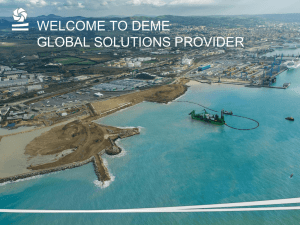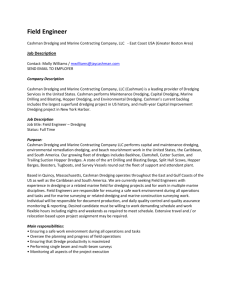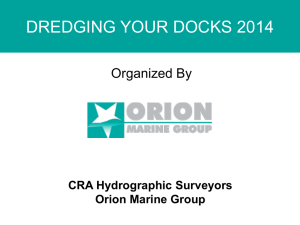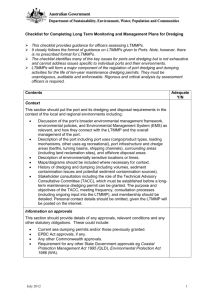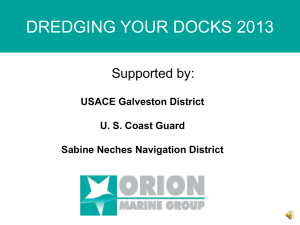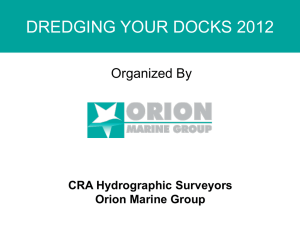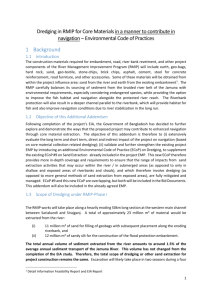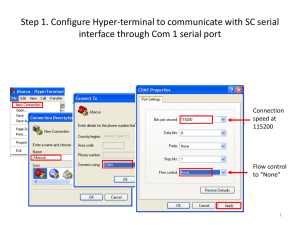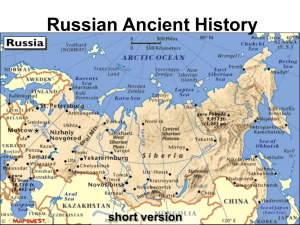What is dredging?
advertisement
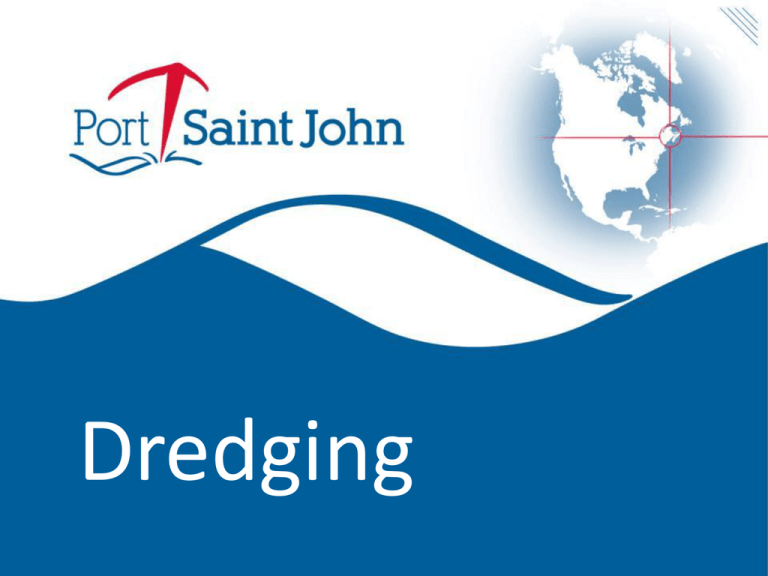
Dredging Why do we dredge? We don’t want any ships to run aground! Dredging 2 What is dredging? • Dredging is a mechanical means of removing sediment from waterways. • The sediment is scraped, scooped, or pumped up to the dredging barge to be transported away. Dredging 3 Dredging at Port Saint John 4 Dredging Why do we dredge? • • • • • The movement of sediments into the Saint John Harbour is a natural phenomenon. The Saint John River and the Bay of Fundy move silt back and forth all day long due to the river flow and the tide movement. This silt is pushed around and then dropped off at the Port where it collects. If the harbour floor has too much silt built up it could create a problem and potentially lead to ships running aground. This would be considered a hazard. In Saint John we have a naturally deep harbour but because of the movement of sediment at the mouth of the river (where it meets the Bay of Fundy) dredging must occur every year for several months. The forces of the river and tide are very strong. In these photos you can you see two forces pushing against each other. Dredging 5 How does dredging make our Port safe? • By dredging, we can increase the depth of our harbours to allow ships to navigate through. • The main shipping channel must be 8.4 m deep when tidal waters are at their lowest to allow large cargo and cruise ships to enter. (That is the height of a 2 ½ storey building). • Harbour Pilots use navigational charts to determine the base depth. An example of a Navigational Chart. The numbers represent depth in metres. Notice how shallow the water is around the island. • Port Saint John dredges every year so that the numbers represented on the chart are true. For example, if the ship needs 8 m of water and the chart says there is 10 m at that location, it will be safe to enter. Dredging 6 Chart of the Saint John Harbour Dredging 7 How do we know when to dredge? • First we discover where dredging is required. To do this we use a technique called hydrographic surveying. • This uses a computerized sonar sounding system. • Sound waves are sent out to determine the depth of the area below. • If the sonar results show that there is not enough depth for the ships which come to Saint John, dredging is needed in that location. Dredging 8 What happens before we dredge? • We consider the environment. • After the hydrographic survey is completed, samples of the silt in the areas noted for removal are then taken and studied in a lab. • Contaminated silt must be treated and deposited on shore under special controlled circumstances. • Silt that is not contaminated is deposited at a “dumping site” identified by government agencies that protect the environment and wildlife (Environment Canada and the Department of Fisheries and Oceans). Our dumping site is at Black Point. • Dredging Did you know that lobsters use the silt beds at Black Point for breeding grounds? The area has the perfect: • Water temperatures • Texture • Light • Nutrients 9 How do we dredge at Port Saint John? • A dredging company is hired to remove the silt. • The dredging machine is a large crane with a scoop on a specialized barge which has its own wheelhouse. • The scoop is first lowered into the water, then raised bringing up the silt where it deposits it on the barge. • Once the barge is full of silt, it moves to the spot assigned for dumping and releases it there. Dredging 10 When do we dredge? • Dredging occurs between July and November. • During this time, the lobster and fishing season are over so this industry and activity will not be disrupted. • Port Saint John has been dredging the harbour for many years. This photo is from 1950. Dredging 11 What is the cost? • • • • • • Dredging is the single largest business expense for Port Saint John. About 1/3 of all the revenue made from business at the Port is spent on dredging each year. In 2012, the cost of dredging was $4.2 million. The cost always depends on how much silt must be removed and how much the dredging company charges per unit of material. Due to the high expense of dredging the Port is partnering in a 4-year study with scientists at UNB to look at ways we can predict the sediment each year, and, perhaps, alter the water flow to reduce the amount of dredging. Other locations, such as the Fraser River in British Columbia, spend up to $10 million on dredging every year. They can lessen the cost by selling the gravel they dredge from the river. We cannot do that here because our dredge material (silt) is too wet and the particles of sediment are much finer; therefore it is not useful for construction. Dredging 12 Who benefits from dredging? • We all do! • Dredging gives harbour pilots confidence navigating all types of ships into the harbour • Dredging means larger ships can visit Saint John with cargo and cruise passengers • Dredging means more people come to visit, more cargo comes through the Port, and as a result… o Jobs are created in the region by the activity generated from both cargo and cruise. o Businesses are expanding and new ones starting up. o All this expands our world. Dredging 13 For more information about Port Saint John… Visit Port Saint John’s website at www.sjport.com . You will find: – Daily vessel reports (ships in port for the day and what cargo they are carrying) – Cruise ship schedules – A link to tidal information – News about the Port Follow us on Twitter @PortofSaintJohn Dredging 14
